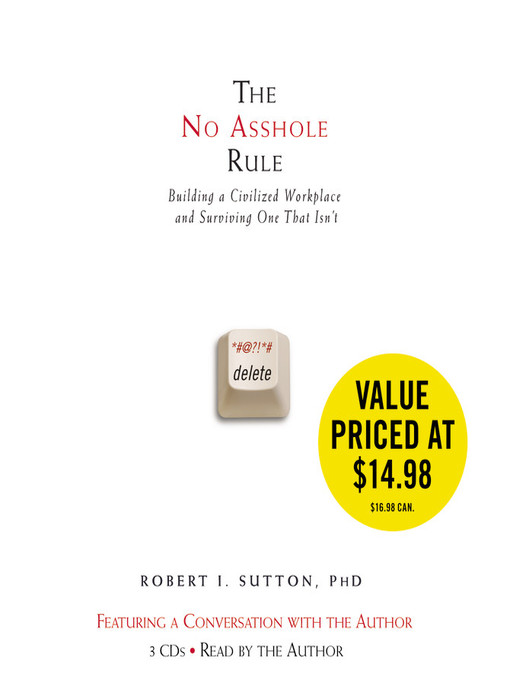
The No Asshole Rule
Building a Civilized Workplace and Surviving One That Isn't
فرمت کتاب
audiobook
تاریخ انتشار
2007
نویسنده
Robert I. Suttonناشر
Hachette Audioشابک
9781594838682
کتاب های مرتبط
- اطلاعات
- نقد و بررسی
- دیدگاه کاربران
نقد و بررسی

Did the HARVARD BUSINESS REVIEW really print an article that used the word "asshole" eight times? Apparently so, and from it evolved this audiobook, a handy guide to the domineering bullies found in the workplace, on the sports field, and in government. Turns out that these "kiss up, kick down" individuals don't just ruin our day, they also cost business and government a great deal of time and money. Is there hope? Sutton seems to think so and offers systems, case studies, and ideas for weeding out these unpleasant individuals. The author reads this abridgment in a friendly, informative style, making it one of the stronger business titles this season. R.W.S. (c) AudioFile 2007, Portland, Maine

January 29, 2007
Expletive or not, by the end of this book, listeners will be desensitized to the word "asshole," which is said hundreds of times in this audiobook. Sutton's premise seems pretty simple: get rid of arrogant jerks in the work place from every level of an organization. Through each chapter, he explores a different aspect of assholes, from identifying the type to dealing with them to what one should do if they believe they are an asshole to why it may be beneficial to keep one or two around. You'd think with a title like The No Asshole Rule, some humor would follow, but that's where the book falters. It's too serious and often too simplistic in its resolutions for curing the asshole problem at work. Sutton's reading of his own words lacks conviction. The interview with the author at the end proves interesting since his answers feel more candid than the rehearsed words of the audiobook.

May 15, 2007
Professor Sutton (organizational psychology, Univ. of Michigan;Weird Ideas That Work ) provides a unique, in-your-face business guide to increasing productivity by weeding out problem employees and avoiding hiring them in the first place. Using numerous examples of behavior by jerksthey are demeaning, insulting, or abusive of othersSutton explains the total cost of these "assholes" in today's corporations, and he shows how to spot one of them by their frequent use of rude interruptions, subtle putdowns, public humiliations and insults, sarcasm, and teasing. The author also wisely draws on research data to show how managers can eliminate this type of mean-spirited and unproductive behavior in order to generate a productive workplace. Case studies include the embarrassing, negative behavior of former business executives and government officials that became public, a description of how an analysis of Google's "don't be evil" maxim helped launch the company to unprecedented early growth, and the approach used by JetBlue and Southwest Airlines to evict passengers who demean their employees. This refreshingly new material is soundly narrated by the author and nicely supplements the business literature that predominantly focuses on leadership styles. Relevant for all organizations, this program is recommended for university libraries supporting a business curriculum and larger public libraries.Dale Farris, Groves, TX
Copyright 2007 Library Journal, LLC Used with permission.

February 1, 2007
We all know them or know of them--the jerks and bullies at work who demean, criticize, and sap the energy of others, usually their underlings. It could be the notorious bad boss or the jealous coworker, but everyone agrees that they make life miserable for their victims and create a hostile and emotionally stifling environment. Fed up with how these creeps treat others and poison the workplace, Sutton declares war and comes out calling them exactly what they are--"certified assholes." Caricatured in sitcoms such as " The Office," these brutes are too often tolerated until irreparable damage is done to individuals and the organization as a whole. Sutton's "no asshole rule" puts a stop to the abuse in no uncertain terms. Similar rules have transformed such companies as JetBlue, the Men's Wearhouse, and Google into shining examples of workplaces where positive self-esteem creates a more productive, motivated, and satisfied workforce. If you have ever been a victim, just reading Sutton's analysis brings calm relief, empowerment, and reassurance that you're not alone.(Reprinted with permission of Booklist, copyright 2007, American Library Association.)

























دیدگاه کاربران